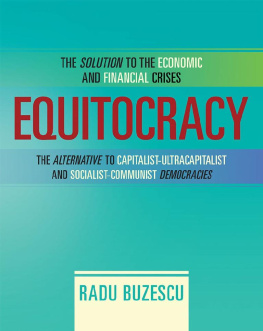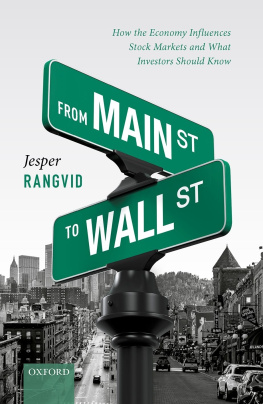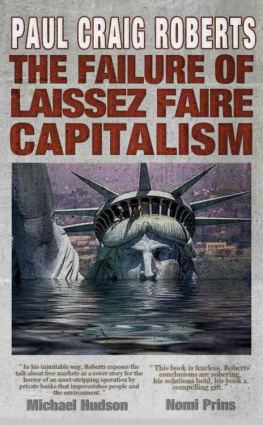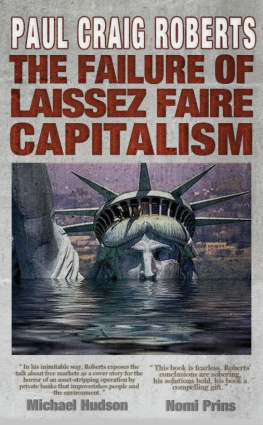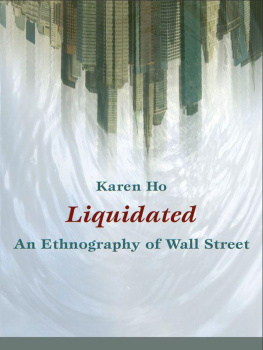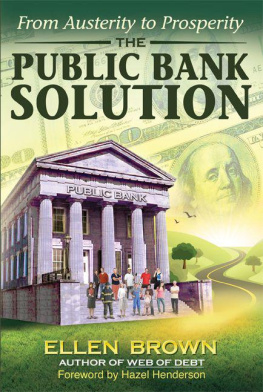The Solution to the Economic and Financial Crises
Equitocracy
THE ALTERNATIVE TO CAPITALIST-ULTRACAPITALIST AND SOCIALIST-COMMUNIST DEMOCRACIES
RADU BUZESCU

Equitocracy
The Alternative to Capitalist-Ultracapitalist and Socialist-Communist Democracies
Copyright 2012 by Radu Buzescu
All rights reserved. No part of this book may be used or reproduced by any means, graphic, electronic, or mechanical, including photocopying, recording, taping or by any information storage retrieval system without the written permission of the publisher except in the case of brief quotations embodied in critical articles and reviews.
iUniverse
1663 Liberty Drive
Bloomington, IN 47403
www.iuniverse.com
1-800-Authors (1-800-288-4677)
Because of the dynamic nature of the Internet, any web addresses or links contained in this book may have changed since publication and may no longer be valid. The views expressed in this work are solely those of the author and do not necessarily reflect the views of the publisher, and the publisher hereby disclaims any responsibility for them.
Any people depicted in stock imagery provided by Thinkstock are models,
and such images are being used for illustrative purposes only.
Certain stock imagery Getty Images.
ISBN: 978-1-4759-2902-7 (sc)
ISBN: 978-1-4759-2903-4 (e)
iUniverse rev. date: 09/18/2018
For information e-mail:
Contents
If at first an idea does not seem absurd, then there is no hope for it.
Albert Einstein
T he author gratefully acknowledges the help and advice given before the completion of this work by the following consultants: Dinu Aloman, MS (physics); Stefan Antohi, PhD, MD (genetics); Matthew Nadelson, BA (psychology); Vasile Serenciuc, MS (chemistry); Alyssa Spector, BA (computer graphics); Horia Vidoni, MS (cybernetic economy and planning); and Teddy Wong, PhD (mathematics).
I ndividuals who criticize the present economic and financial situation in Americaas representatives of different political parties, organizations, and movementsare often asked to do something to address the issues. Most of them agree that such issues should not only be addressed but redressed in such a way as not to create further frustration and disappointment in the majority of Americans. Here are some of those issues:
(1) The American consumer is flooded with junk products made abroad by (strangely enough) American private corporations and firms using cheap, unskilled labor for manufacturing while many hardworking, skilled Americans are left out of work.
(2) The increasing gap between super-rich Americans, on one side, and middle class and poor Americans, on the other side, has caused mass rallies of protest in cities across America.
(3) The incredible amount of American national debt due to government overspending and unrestrained borrowing policies is affecting the future solvency of Social Security and pension funds.
(4) Controversy erupted and continues over the governments bailout of bankrupt big banks and corporations, which rewarded the incompetence of their owners and their chosen or appointed boards of directors.
(5) A significant gap exists between the constantly increasing cost of living for the majority of Americans and their buying power.
(6) Traditional American moral values have decreased due to the intentional propagation of a concept that can be summed up this way: As long as I make lots of money, I do not care if many of my fellow citizens lose jobs and households.
(7) Speculation through risky investments for making money and acquiring property has increased, ending in catastrophic financial and real estate losses.
In the present international context, one should bear in mind Americas vital ties to the European Union. America and Europe are so dependent on each other that if one goes down, the other goes down too. Therefore, a financially and economically healthy, united, and strong Europe is in Americas interest and vice versa. Unfortunately, within the European Union, the democratic West is plagued by social parasitism and overtaxation, whereas the formerly communist East has succumbed to mafia-style plunder from the state patrimony by former Communist Party officials turned rich capitalists overnight.
Following extensive research, the author approaches the structures of these capitalist-ultracapitalist and socialist-communist systems from three different perspectives. (1) Psychological: Why have these systems become so attractive to many people? (2) Socio-organizational: Why have both systems led to the control of wealth by a small group of individuals? (3) Economic-financial: Why are both systems periodically shaken by crises?
The authors purpose goes beyond addressing issues such as those mentioned by clearly and precisely indicating the way to restructure a society beset by social, economic, and financial crises.
Horia Vidoni, MS (cybernetic economy and planning)
F rom its beginnings to this day, human society has been organized on nonegalitarian bases in the sense that individuals, groups, and classes separatedas they gradually developed in the surrounding environmentthrough forms of land ownership, means of production, transportation, communication, etc., as well as through means of payment.
In the primitive communal system, interests and objectives were linked to families, tribes, and groups of people, often leading to conflicts for possession of the territories from which food was obtained and for the preservation of these territories.
In the slavery system individuals were divided into slave owners, the masters of the land and of the means of production, and slaves, who, having neither land nor means of production, were at the mercy of the slave owners. In the slavery system, however, there were also free individuals whose interests and objectives were linked to a practical occupation (for example, merchants or craftsmen). Under this system there comes into being the state as authority represented by a group of persons forming a political-administrative body called government. (As a rule, the state tends to represent the interests of an economically dominant group, although its role is to create a state of equilibrium among different social classes and to harmonize their interests.)
In the feudal system individuals were divided into feudal lords, the owners of the land, and peasants and craftsmen, who were producers of goods and also owners of small parcels of land and of some means of production as well as independent households, but were also subject to labor conscription and taxes for the exclusive benefit of the feudal lords.
In capitalism separation of individuals expands by occupation or profession into different groups that are put together on the basis of a general yet relevant characteristicthe relative possession or lack of possession of land, means of production, and capitaland referred to as homogenous social classes. Thus, there is the class of capitalists or employers as opposed to the class of workers or wage earners (who possess just their working power, which they sell to the capitalists); then there is the class of big landowners (who own large stretches of land) as opposed to the class of peasants (owners of relatively small parcels of land). There are also the class of bankers (whose weight in society increases following accumulation of liquid assets), the class of merchants, and so on. All of these classes are supposed to have interests specific to each of them. Under the condition of preservation and inviolability of private property, the creed of capitalism is this: gaining profit under free competition through supply and demand.
Next page
